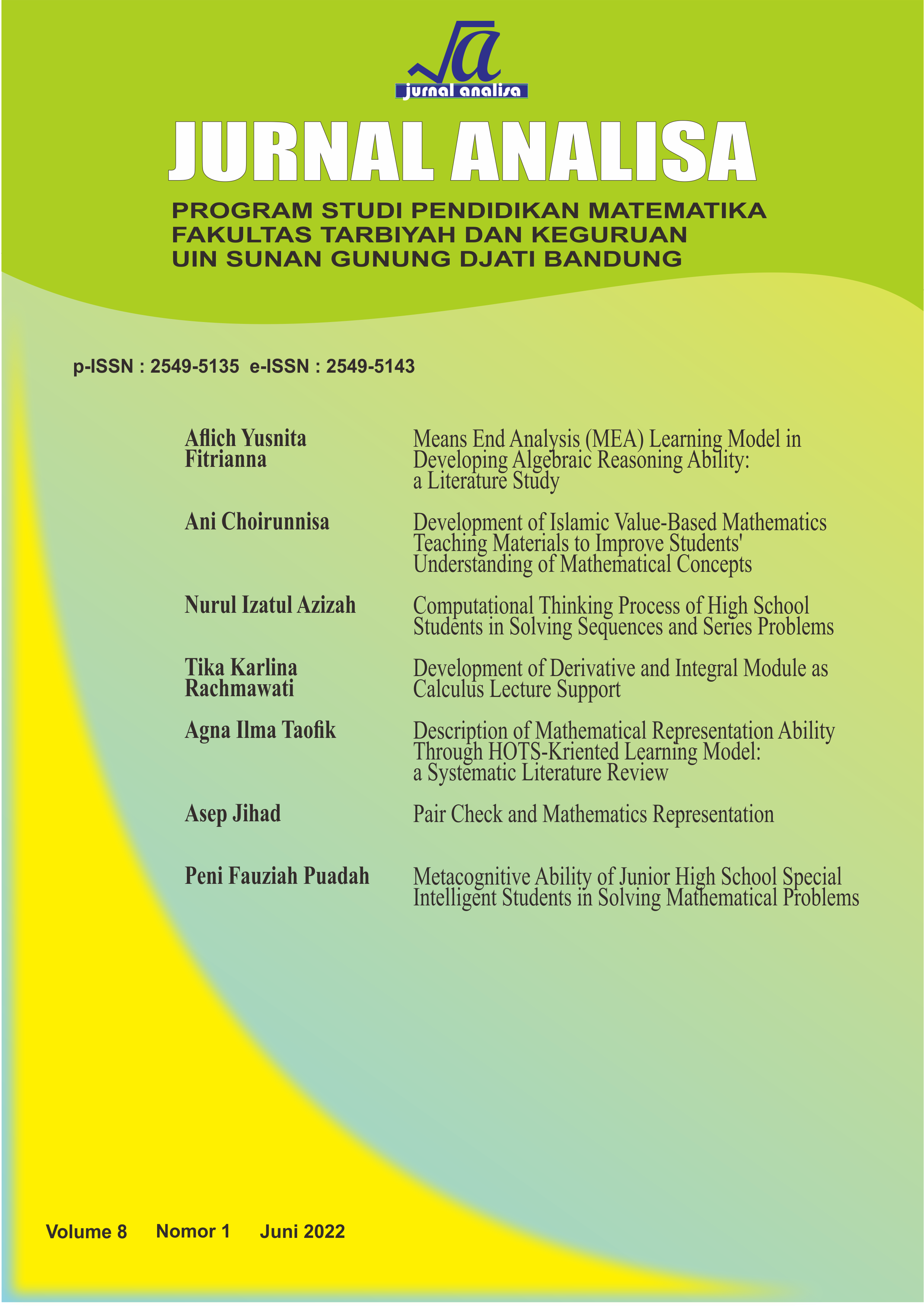Metacognitive Ability of Junior High School Special Intelligent Students in Solving Mathematical Problems
DOI:
https://doi.org/10.15575/ja.v8i1.15934Keywords:
Metacognition, Metacognitive ability, Mathematical Problem-Solivng, Special IntelligentAbstract
Metakognisi adalah suatu tingkatan dalam proses berpikir yang dapat digunakan siswa untuk memecahkan masalah, memiliki kesadaran terhadap proses berpikirnya dan mengontrol cara berpikirnya. Pada pembelajaran matematika di sekolah kita sering menemukan banyak siswa yang mengalami kesulitan dalam memecahkan masalah disebabkan kurangnya kesadaran dan control dalam diri mereka. Kesulitan ini pun terjadi pada siswa kategori cerdas istimewa yang memiliki IQ di atas 130. Pada penelitian ini, peneliti ingin melihat bagaimana kemampuan yang dimiliki oleh siswa cerdas istimewa dalam memecahkan masalah matematika. Penelitian ini menggunakan metode kualitatif deskriptif. Penelitian ini dilakukan di sebuah SMP di kota Bandung dengan sample sebanyak 13 orang siswa cerdas istimewa. Untuk mengukur kemampuan metakognisi, siswa diberikan soal pemecahan masalah beserta angket metakognisi. Dari hasil penilaian pemecahan masalah, siswa cerdas istimewa memperoleh nilai rata – rata sebesar 59. Secara rinci, kemampuan metakognisi siswa cerdas istimewa berdasarkan angket yang mereka isi berada pada kriteria cukup baik untuk tahap planning, monitoring dan evaluating yaitu berada di kisaran 41% - 60%, dengan presentase berturut – turut 58,46%, 52,56% 53, 64%. turut 58,46%, 52, 56% 53, 64%.
Â
Metacognition is a level in the thinking process that students can use to solve problems, have awareness of their thinking processes, and control the way they think. In learning mathematics in schools, we often find many students who have difficulty solving problems due to a lack of awareness and control within themselves. This difficulty also occurs in the special intelligent category students who have an IQ above 130. In this study, the researcher wanted to see how the abilities possessed by special intelligent students in solving mathematical problems. This research is a descriptive qualitative method. This research was conducted in a junior high school in Bandung with a sample of 13 special intelligent students. To measure metacognitive ability, students are given problem-solving questions along with a metacognition questionnaire. From the results of the problem-solving assessment, the special intelligent students got an average score of 59. In detail, the metacognitive abilities of the special intelligent students based on the questionnaires they filled were in the good criteria for the planning, monitoring, and evaluating stages, which were in the range of 41% - 60 %, with a successive percentage of 58.46%, 52.56% 53,4%.
References
Hutabarat, Y. (2020). Tingkat Kemampuan Pemecahan Masalah Matematika Siswa SMP. Research Gate, June.
Irham, M. (2015). Pola Metakognisi dan Kemampuan pemecahan Masalah Siswa Melalui Think Aloud Pair Problem Solving (TAPPS). Prosiding Seminar Nasional Matematika IX 2015, 161–169.
Kuzle, A. (n.d.). Patterns of Metacognitive Behavior During Mathematics Problem-Solving in a Dynamic Geometry Environment. In International Electronic Journal of Mathematics Education-IΣJMΣ (Vol. 8, Issue 1).
Lai, E. (n.d.). Metacognition : A Literature Review Research Report Metacognition : A Literature Review.
Lapele, D. A. (2020). Metacognitive Awareness Inventory ( MAI ) Students in Online Learning. 6–13.
Louca, E. P. (2019). Do children know what they know? Metacognitive awareness in preschool children. New Ideas in Psychology, 54, 56–62. https://doi.org/10.1016/j.newideapsych.2019.01.005,
Nugrahaningsih. (2012). Garuda - Garba Rujukan Digital. https://garuda.kemdikbud.go.id/documents/detail/253194
Strategy, M. L., & Riyadi, I. (2017). Metacognitive Learning Strategy Iswan Riyadi, Hersulastuti, Th. Kriswiantianti Nugrahaningsih. 1(1), 13–24.
Surya, Muhammad. (2015). Strategi Kognitif dalam Proses Pembelajaran. Bandung: Alfabeta
Widadah, S., Afifah, D. S. N., & Suroto. (2013). Profil Metakognisi Siswa Dalam Menyelesaikan Soal Sistem Persamaan Linear Dua Variabel Berdasarkan Gaya Kognitif (Metakognisi’S Profile Student in Solve Equation System Problem Linear Two Variable Bases To Inspire Kognitif). Jurnal Pendidikan Matematika STKIP PGRI Sidoarjo ISSN: 2337-8166, 1(1), 13–24.
Downloads
Published
Issue
Section
License
Authors who publish in Jurnal Analisa agree to the following terms:
1. Authors retain copyright and grant the journal right of first publication with the work simultaneously licensed under a Attribution-ShareAlike 4.0 International (CC BY-SA 4.0) License that allows others to share the work with an acknowledgment of the work's authorship and initial publication in this journal.
2. Authors are able to enter into separate, additional contractual arrangements for the non-exclusive distribution of the journal's published version of the work (e.g., post it to an institutional repository or publish it in a book), with an acknowledgment of its initial publication in this journal.
3.Authors are permitted and encouraged to post their work online (e.g., in institutional repositories or on their website) prior to and during the submission process, as it can lead to productive exchanges, as well as earlier and greater citation of published work (See The Effect of Open Access).
